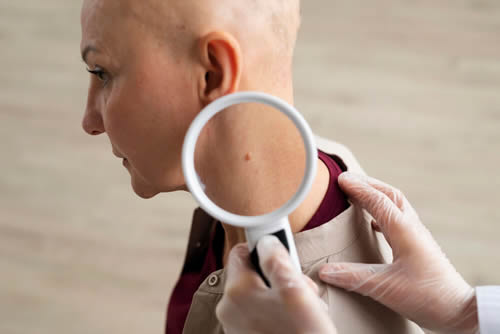Skin damage from sun exposure has gotten a lot of attention over the years because of its impacts on the risk of skin cancer. Although some types of skin cancer are hereditary, many can be avoided by taking smart preventative measures.
What is skin cancer?
Abnormal skin cells are at the root of skin cancer. If the DNA of skin cells becomes damaged, skin cancer may occur. It is the most common type of cancer in the United States and affects all types of skim pigmentations. It does not just affect skin that is exposed to the sun, but less obvious skin like the palms can also be affected by skin cancer.
Who can get skin cancer?
No one is completely immune to skin cancer, but those with increased risk for the disease include those with:
- Chronic sun exposure
- Fair skin
- Tanning bed use
- Severe sunburns
- Family history of skin cancer
- History of radiation therapy
- Immune-suppressing drugs
What are the different types?
There are two primary types of skin cancer: non-melanoma and melanoma. Non-melanoma cancers may be:
- Basal cell carcinoma found in the outer layer of skin. This is the most common type of skin cancer and does not typically spread throughout the body. It may appear as pink or red areas, open sores, or smooth bumps on the skin.
- Squamous cell carcinoma, the second most common type, impacts the squamous cells in the top layers of skin. These growths are often raised and crusty, sometimes bleeding as with open sores.
Melanoma is the most dangerous type of skin cancer, killing more than 10,000 Americans every year. It can develop from an existing mole or it can simply look like a mole. The key is to keep an eye out for a mole or freckle that looks unusual. Physicians recommend focusing on the spot’s asymmetry, border, color, diameter, and how it evolves or changes in appearance. Anything out of the ordinary in these categories should be evaluated by a qualified dermatologist such as Dr. Bernard Raskin in Bakersfield.
Can skin cancer be prevented?
There are ways to help prevent skin cancer. The first is to consistently use a broad-spectrum sunscreen with an SPF of 30 or higher. It should be approved for UVA and UVB rays and applied on all areas of the body exposed to sunlight. Sunscreen should be reapplied every two hours and always after swimming or sweating. Another tip is to avoid UV radiation, which means staying in the shade and avoiding direct sunlight during the peak hours of 10 a.m. to 4 p.m. Also cover your arms, legs, and face to protect your skin. Tanning beds should be avoided completely because they emit about 12 times more UVA ray than actual sunshine. Finally, perform regular skin self-examinations monthly to check for differences in your skin. Look for new or changed spots and areas that itch or bleed. If you are concerned about any suspicious lesions, consult with our dermatologist to make sure you are safe from skin cancer.


